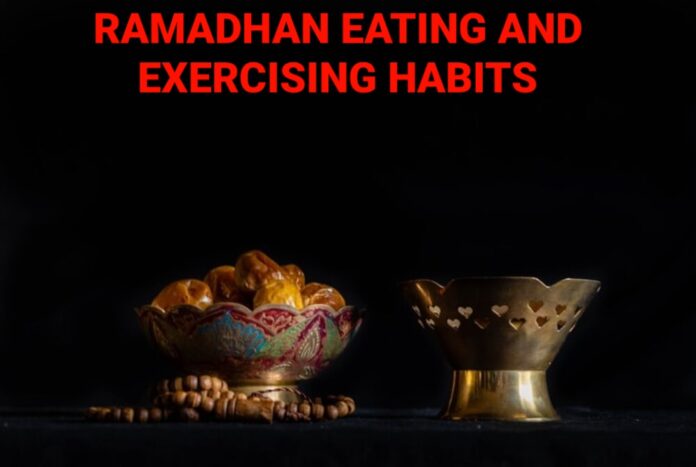While intermittent fasting during Ramadan has a positive impact on the body, it hampers workout routines. Dr Sadia Chishty addresses this issue and shares tips on how to achieve a balance.
Muslims in India marked Ramadan, the ninth month of the Islamic calendar on Wednesday. During Ramadan, Muslims are obligated to fast from dawn to dusk by abstaining from all forms of food and drink.
Dietary habits of those who fast change during this month, as breakfast, lunch and dinner are replaced with a pre-dawn mean called suhoor, post-sunset meal called iftar and dinner.
While this form of intermittent fasting has a positive impact on the body in various ways, it also hampers the workout plans of many gym-goers.
Speaking on this issue with #KhabarLive, Dr Sadia Chishty, nutritionist and academic counsellor at Jamia Hamdard, tells #KhabarLive on how one can maintain a workout routine while fasting, the preferred dishes one should have during suhoor and iftar and the precautions one should take to deal with the Covid-19 pandemic during Ramadan. Excerpts:
1. Is it okay to exercise while fasting? If yes, what is the best time to squeeze in a workout during Ramadan?
One should not start a new exercise routine during Ramadan. Intense exercise while fasting can lead to reduced muscle mass and muscle strength. However, it is advisable to do medium-intensity workouts during this month. Apart from going to the gym, one can go for a walk, cycle or even do light jogging.
Ideal time for exercising would be after iftar. Workouts spanning 20-45 minutes are ideal. One can also exercise before suhoor after having a small snack and plenty of water. This should be followed by a nutrient-dense meal.
2. According to you what’s an ideal suhoor meal?
During suhoor fibre and protein rich foods should be consumed. This helps in increasing the satiety value of the meal. Eggs, curd, milk, whole cereals, pulses, chicken and fish can be incorporated to achieve this.
Good meal options for suhoor are– Egg and roti with ghee / egg omelette with brown bread/ Couscous (dalia) with milk and dates/ chicken with whole wheat roti/ oats with milk
Preferred drinks—Lemonade/ Thandai/ Sattu/ Green tea/ Tea/ Coffee.
3. What’s an ideal iftar meal?
Iftar meals should be rich in carbohydrate, electrolyte and must include protein-dense foods. Various options that can be added to iftar meals are:
Cereals
a) Wheat/Rice-brown bread sandwich/ Whole wheat cake/Idli
b) Fruits with boiled quinoa
c) Oats and cold milk with fruits/ Oats dosa
d) Poha- egg poha/ peanut poha/ sprouts poha
Pulses and other protein sources
a) Dal /Sprouts / Chana chaat/ Sprouts rolls/ Haleem/ Sattu
b) Tofu/Paneer- rolls/Sandwich/Salad
c) Chicken- rolls/Kababs
d) Boiled egg salad/ Egg custard / Egg sandwich / Egg pasta (whole wheat pasta)
e) Soya granules- stuffed in roti/ cutlet/ soyachops
Milk (toned)–Thandai/Milkshake/Curd/Buttermilk
Fruits--Dates/Fruit chaat/Whole fruits/ Smoothie/ Fruit raita
Drinks–Thandai/Coconut water/ Fruit shake/Shikanji/Lassi/ Iced green tea (mint leaves +lemon juice)/ Almond milk/Coconut milk/Tea/Coffee
Options for dinner: Rice and dal/ Veg soya pulav with green chutney/ Egg curry with roti
It is important to note that diet is planned as per one’s requirement, routine, physical activity and appetite. Different people show different response to similar diets. However, the key to any diet lies in moderation and the portion size should be maintained if one wants to lose weight.
• Meals rich in both soluble and insoluble fibre like fresh fruits, green and leafy vegetables, salads, whole grains and whole pulses should be included in the diet.
• Fasting causes one to crave for sweet and fried foods. To deal with this one can include steamed, grilled, boiled, baked foods in their meals. Fruits can be used to substitute sweets.
• Minimal oil should be used.
• In case of acidity, ice creams, cucumber with curd or cold milk with Roof Afza can be taken.
4. What impact does fasting have on the body?
Intermittent fasting (IF) has become vogue in the West since the last few years. But it has been part of our culture for a long time, whether be it during Navaratri or Ramadan. IF aids weight loss, increases metabolism and reduces insulin resistance. Research has established that fasting also helps control bad cholesterol and maintains healthy triglycerides levels.
Many studies have also proven that fasting augments human growth hormones by manifold levels. This helps speed up the healing process after injury and helps repair muscle tissues after exercise. It also increases muscle mass and boosts metabolism and toxins from the body.
5. Anything that should be avoided?
Avoid heavy meals, fried food, cream, refined flour, refined sugar and processed foods. Don’t eat fruits and cooked foods at the same time. Do not drink excessive coffee as it can have a “diuretic effect” and cause dehydration. Do not use high fat salad dressings like mayonnaise, cream, salad oils etc. Do not overeat as it might cause your blood sugar levels to spike.
6. Any special dietary precautions we should take keeping the covid-19 pandemic in mind
Building one’s immunity is a long process. One should include all food groups to strengthen one’s immunity. #KhabarLive #hydnews







